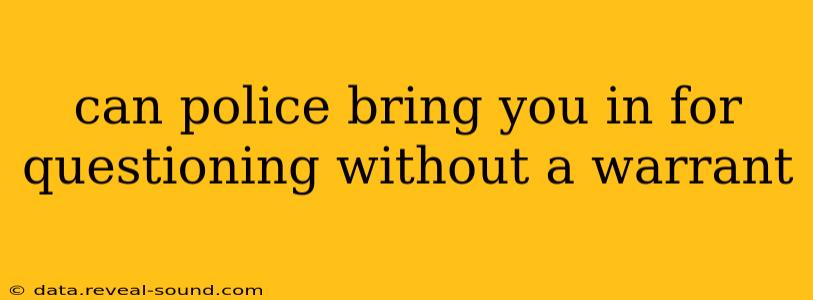The short answer is: yes, but with important caveats. While police generally cannot arrest you without a warrant, they can detain you for questioning under certain circumstances. Understanding these circumstances is crucial to protecting your rights. This post will clarify the legal boundaries surrounding police questioning and detention without a warrant.
What are the circumstances under which police can detain you for questioning without a warrant?
This typically falls under what's known as a Terry Stop, named after the Supreme Court case Terry v. Ohio. A Terry Stop allows police to briefly detain a person based on reasonable suspicion of criminal activity. This is a lower standard than probable cause, which is required for an arrest. "Reasonable suspicion" means the police have specific and articulable facts that would lead a reasonable person to believe a crime has been, is being, or is about to be committed.
Key elements of a lawful Terry Stop:
- Reasonable Suspicion: The police must have a reasonable suspicion, based on observable facts, that a crime has occurred, is occurring, or is about to occur. A hunch or gut feeling is not enough.
- Brief Detention: The detention must be brief and limited to the time necessary to investigate the reasonable suspicion. The police cannot hold you indefinitely.
- Limited Scope: The scope of the detention is limited to the investigation of the initial reasonable suspicion. They can't expand the search or questioning without additional justification.
Can police bring you in to the station for questioning without a warrant?
Generally, no. While a Terry Stop allows for brief questioning at the scene, bringing someone to the station for questioning without a warrant is usually considered an arrest, which requires probable cause. There are limited exceptions, such as when there is an immediate threat to public safety or a need to prevent the destruction of evidence. Even in these exceptional circumstances, the detention must still be justified and reasonable.
What are my rights during a police stop and questioning?
You have several key rights during a police stop:
- The right to remain silent: You are not obligated to answer any questions. You can politely but firmly decline to answer any questions. Saying "I'm choosing to remain silent" is perfectly acceptable.
- The right to an attorney: You have the right to speak to an attorney before answering any questions. If you're arrested, an attorney should be appointed for you if you can't afford one.
- The right to refuse a search: Generally, police need a warrant to search you or your belongings. However, if they have reasonable suspicion to believe you're armed, they may conduct a pat-down search for weapons.
What should I do if police stop me?
Remain calm and polite. Clearly state that you understand your rights and that you wish to remain silent or speak to an attorney. Do not resist arrest. Try to remember details of the interaction, such as the officer's name and badge number, location, and time.
What if the police search my car without a warrant?
The police can search your car without a warrant under specific circumstances, such as if they have probable cause to believe there's evidence of a crime inside. They may also search your car if they have your consent or if the car is impounded.
What constitutes probable cause for an arrest?
Probable cause means there is a reasonable belief, based on facts and circumstances, that a crime has been committed and that the person being arrested committed it. This is a higher standard than reasonable suspicion.
Disclaimer: This information is for educational purposes only and should not be considered legal advice. If you have specific questions about your rights or a legal situation, consult with an attorney. Laws vary by jurisdiction, and the specific details of any situation will determine the applicable legal standards.
